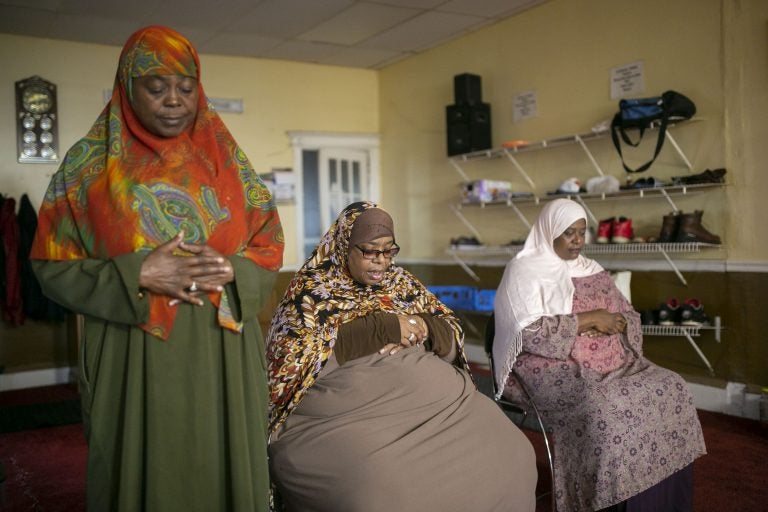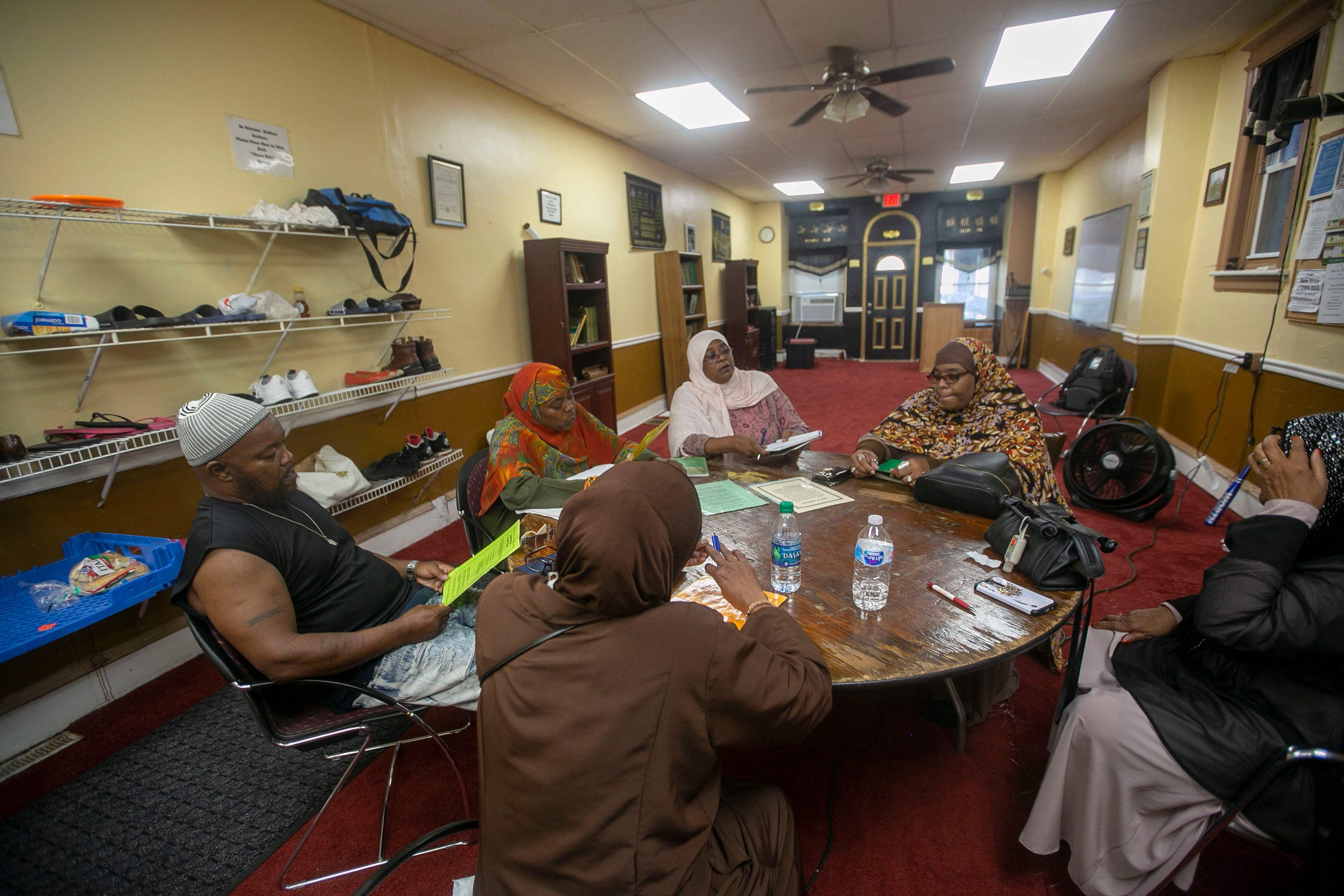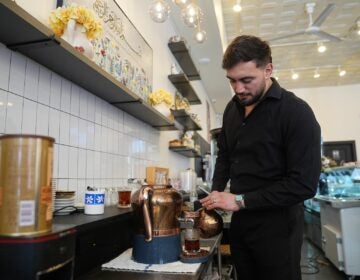‘We’re in the business of saving lives’: In Camden, a 12-step recovery program for Muslims celebrates 30 years
On Saturday, Millati Islami World Services — the national organization that supports chapters across the country — will host its 30th-anniversary celebration in Camden.

Stephanie Adams (left) prays during a Millati Islami meeting in Camden, N.J. (Miguel Martinez for WHYY)
For Stephanie Adams, being Muslim didn’t stop her from having a substance use disorder.
But a year into her recovery, a close friend of hers was also grappling with addiction. They said they’d attend a 12-step meeting if it had connections to Islam. Adams found a flier for a Milatti Islami meeting — a recovery program that has adapted the 12-step model of recovery to follow the religious principles of Islam — at Masjidun Nur in Camden.
Nearly 10 years later, she’s the secretary of the Millati Islami program at The Quba School, a mosque and Islamic school in Camden.
“Now Millati Islami has been there for me in some hard times,” Adams said. “It helped me through depression, it helped me through heartbreak. The most help I received from Millati Islami was in the last four years because it teaches you that there is nothing that can ever make you go back to using.”
On Saturday, Millati Islami World Services — the national organization that supports recovery chapters across the country — will host its 30th-anniversary celebration at the Urban Banquet Hall in Camden. The organization first started in September 1989 at a masjid in Baltimore.
Although the Camden and other local chapters have struggled to stay afloat over the past several years, to those who attend the meetings, Millati Islami — which means “path of peace” — remains a strong part of their identity and recovery.

Ameen Abdur-Rasheed, who founded a now-closed Millati Islami chapter in Philadelphia, said there’s a common misconception that programs like Alcoholics and Narcotics Anonymous are based on Christianity. But in fact, they’re based on principles of spirituality.
Abdur-Rasheed said the difference between 12-step meetings like AA and Millati Islami is in the third step of the program: “Made a decision to turn our will and our lives over to the care of God as we understood him.”
“What it allowed for is each individual of Alcoholics Anonymous to decide for themselves who their higher power was,” Abdur-Rasheed said. “They didn’t call him by any particular name, they just said the God of their understanding. Now with Millati Islami, our third step states that we made a decision to submit our will to Allah because of course, we do know who our higher power is.”
Those who choose to attend a Millati Islami meeting will find a format very similar to that of NA or AA, Abdur-Rasheed said. It’s something he knows first-hand.
The Philadelphia man started his recovery in 1989 — the same year that Millati Islami was founded. However, his process was through Alcoholics Anonymous.
It wasn’t until after performing Hajj — the pilgrimage to Mecca — in 2006 that Abdur-Rasheed felt compelled to do something for both the local Muslim and recovery communities.
“I had a copy of the Millati Islami book at home,” Abdur-Rasheed said. “I picked it up, read it cover to cover and made the decision that this is something that I needed to do.”
He started meetings at Masjidullah in West Oak Lane and The Quba School in West Philadelphia in 2007. But eventually, attendance fell off and meetings in the city stopped.
“One thing that we found nationally is there is low attendance,” Abdur-Rasheed said. “However, fortunately, there are cities in the United States that are able to keep going, just as Camden has been able to.”
Both Adams and Abdur-Rasheed said there are a number of factors keeping people from Millati Islami meetings — one of which could be the Islamic view that drugs or alcohol should be avoided and the stigma that comes with addiction.
Yet, at any rehab facility, outpatient treatment center or homeless shelter, you’re going to find Muslims receiving services and treated for addiction, Abdur-Rasheed said.
“We are a part of this society, and we suffer the good and the bad that comes with the society,” Abdur-Rasheed said. “And I believe that within the past 10 years, the stigma for Muslims of being an addict or an alcoholic is diminishing because it is so widespread in many of our families.”
Ali Thompson has attended the meetings in Camden since leaving prison a decade ago. He’s been in and out of recovery for 25 years. He now uses the tools and instruction of Millati Islami in his family and other relationships.
“For me, Millati Islami has made the most sense for my recovery because of the balance for me to acknowledge my spiritual part and everything else that goes along with it,” Thompson said. “It was more than addiction for me. It was also my spirit and soul. I felt like I lost that during the course of addiction so that’s why it remains important to me still.”
Adams, the secretary of the Camden “Survivors Group” as its called, said as many as 10 people can attend a meeting or as few as three people. The Quba School meetings happen Tuesday and Thursday nights.
“I don’t know what drives the change, but we do work to keep the doors open here to make sure there’s somewhere for someone to come who needs help,” Adams said. “That’s a necessity. We try to do a lot for our community, as well as our masjids, as well as each other.”
Although its attendance may fluctuate, Camden remains the longest-running chapter in the region. A Millati Islami chapter has met in Chester, Pa., since 2017.
Adams said another component that she thinks keeps the doors open at the Camden chapter is its welcomeness to everyone — not just people who identify as Muslim.
“We are in the business of saving lives and that’s why we try to encourage everybody of any status in life of any faith to come,” Adams said. “We just ask that you feel free because a lot of times when you go to these meetings you’re like caged up because you are struggling with using and trying to get clean so we encourage people to come so that we can show them that there is another way to live.”
She said the Camden chapter is looking forward to hosting the national celebration for the 30th anniversary on Saturday. And they hope that the spotlight on Camden can help revive the chapter in Philadelphia.
“To us, it’s like the world fair,” Adams said. “We want everything to be so attractive that people will remember it forever, because this may be our last chance to show what Camden can do.”
WHYY is your source for fact-based, in-depth journalism and information. As a nonprofit organization, we rely on financial support from readers like you. Please give today.





